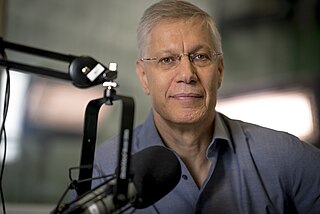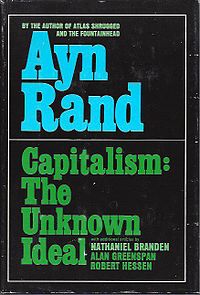
Altruism is the principle and practice of concern for the well-being and/or happiness of other humans or animals. While objects of altruistic concern vary, it is an important moral value in many cultures and religions. It may be considered a synonym of selflessness, the opposite of selfishness.

Alice O'Connor, better known by her pen name Ayn Rand, was a Russian-born American writer and public philosopher. She is known for her fiction and for developing a philosophical system she named Objectivism. Born and educated in Russia, she moved to the United States in 1926. After two early novels that were initially unsuccessful and two Broadway plays, she achieved fame with her 1943 novel, The Fountainhead. In 1957, Rand published her best-selling work, the novel Atlas Shrugged. Afterward, until her death in 1982, she turned to non-fiction to promote her philosophy, publishing her own periodicals and releasing several collections of essays.
In ethical philosophy, ethical egoism is the normative position that moral agents ought to act in their own self-interest. It differs from psychological egoism, which claims that people can only act in their self-interest. Ethical egoism also differs from rational egoism, which holds that it is rational to act in one's self-interest. Ethical egoism holds, therefore, that actions whose consequences will benefit the doer are ethical.
Egoism is a philosophy concerned with the role of the self, or ego, as the motivation and goal of one's own action. Different theories of egoism encompass a range of disparate ideas and can generally be categorized into descriptive or normative forms. That is, they may be interested in either describing that people do act in self-interest or prescribing that they should. Other definitions of egoism may instead emphasise action according to one's will rather than one's self-interest, and furthermore posit that this is a truer sense of egoism.
Objectivism is a philosophical system developed by Russian-American writer and philosopher Ayn Rand. She described it as "the concept of man as a heroic being, with his own happiness as the moral purpose of his life, with productive achievement as his noblest activity, and reason as his only absolute".

Leonard Sylvan Peikoff is a Canadian American philosopher. He is an Objectivist and was a close associate of Ayn Rand, who designated him heir to her estate. He is a former professor of philosophy and host of a nationally syndicated radio talk show. He co-founded the Ayn Rand Institute (ARI) in 1985 and is the author of several books on philosophy.

The is–ought problem, as articulated by the Scottish philosopher and historian David Hume, arises when one makes claims about what ought to be that are based solely on statements about what is. Hume found that there seems to be a significant difference between descriptive or positive statements and prescriptive or normative statements, and that it is not obvious how one can coherently transition from descriptive statements to prescriptive ones. Hume's law or Hume's guillotine is the thesis that an ethical or judgmental conclusion cannot be inferred based on purely descriptive factual statements.
This is a bibliography for Ayn Rand and Objectivism. Objectivism is a philosophical system initially developed in the 20th century by Rand.
Selfishness is being concerned excessively or exclusively for oneself or one's own advantage, pleasure, or welfare, regardless of others.

Peter Schwartz is an American journalist. He is an Objectivist and writes opinion pieces and books from that viewpoint.
Enlightened self-interest is a philosophy in ethics which states that persons who act to further the interests of others ultimately serve their own self-interest.

Yaron Brook is an Israeli-American entrepreneur, writer, and activist. He is an Objectivist and the current chairman of the board at the Ayn Rand Institute, where he was executive director from 2000 to 2017. He is also the co-founder of BHZ Capital Management LP.
The Randian hero is a ubiquitous figure in the fiction of 20th-century novelist and philosopher Ayn Rand, most famously in the figures of The Fountainhead's Howard Roark and Atlas Shrugged's John Galt. Rand's self-declared purpose in writing fiction was to project an "ideal man"—a man who perseveres to achieve his values, and only his values.
Rational egoism is the principle that an action is rational if and only if it maximizes one's self-interest. As such, it is considered a normative form of egoism, though historically has been associated with both positive and normative forms. In its strong form, rational egoism holds that to not pursue one's own interest is unequivocally irrational. Its weaker form, however, holds that while it is rational to pursue self-interest, failing to pursue self-interest is not always irrational.

The Virtue of Selfishness: A New Concept of Egoism is a 1964 collection of essays by the philosopher Ayn Rand and the writer Nathaniel Branden. Most of the essays originally appeared in The Objectivist Newsletter. The book covers ethical issues from the perspective of Rand's Objectivist philosophy. Some of its themes include the identification and validation of egoism as a rational code of ethics, the destructiveness of altruism, and the nature of a proper government.
Ayn Rand, author and developer of Objectivism, held controversial views regarding homosexuality and gender roles. Although Rand personally viewed homosexuality negatively, considering it immoral and disgusting, she endorsed non-discrimination protection for homosexuals in the public sphere while opposing laws against discrimination in the private sector on the basis of individual rights.

In economics, the profit motive is the motivation of firms that operate so as to maximize their profits. Mainstream microeconomic theory posits that the ultimate goal of a business is "to make money" - not in the sense of increasing the firm's stock of means of payment, but in the sense of "increasing net worth". Stated differently, the reason for a business's existence is to turn a profit. The profit motive is a key tenet of rational choice theory, or the theory that economic agents tend to pursue what is in their own best interests. In accordance with this doctrine, businesses seek to benefit themselves and/or their shareholders by maximizing profits.

Capitalism: The Unknown Ideal is a collection of essays, mostly by the philosopher Ayn Rand, with additional essays by her associates Nathaniel Branden, Alan Greenspan, and Robert Hessen. The authors focus on the moral nature of laissez-faire capitalism and private property. They have a very specific definition of capitalism, a system they regard as broader than simply property rights or free enterprise. It was originally published in 1966.
In ethical philosophy, altruism is an ethical doctrine that holds that the moral value of an individual's actions depends solely on the impact of those actions on other individuals, regardless of the consequences for the actor. James Fieser states the altruist dictum as:
"An action is morally right if the consequences of that action are more favorable than unfavorable to everyone except the agent."
Selfism refers to any philosophy, theory, doctrine, or tendency that upholds explicitly selfish principles as being desirable. The term is usually used pejoratively.








